Story highlights
One of these could be America's next lunchbox hero
Served on a crusty roll, the torta is a platform for any number of Mexican favorite ingredients
Koja Grille brings a Korean touch to the City of Brotherly Love's signature sandwich
Vietnamese banh mì is a perfect testament to balance
One way to exemplify the success of the American melting pot is to take a bite into the humble sandwich.
Generations of immigrants to the United States made their new home more palatable by bringing with them tastes of the old country.
Consider the inspirations for the all-American hamburger and hot dog in the German cities of Hamburg and Frankfurt. Eggplant Parmesan arrived with Italian immigrants. The first corned beef started coming over from Ireland in the 1600s, while two centuries later, Jewish Romanians introduced pastrami to their new world.
Now, all these once foreign tastes are considered staples of the American sandwich diet. But times are changing, not just demographically, but also hoagie-logically.
The dominance of the BLT and grilled cheese is being challenged by a wave of newcomers to the United States. But which one will eventually take its place in America’s sandwich pantheon?
You might not be able to find all the following sandwiches at your local deli, but keep an eye out for them on menus; they’re a taste of what’s to come in American sandwiches with these 11 winners:
1. Montreal smoked meat
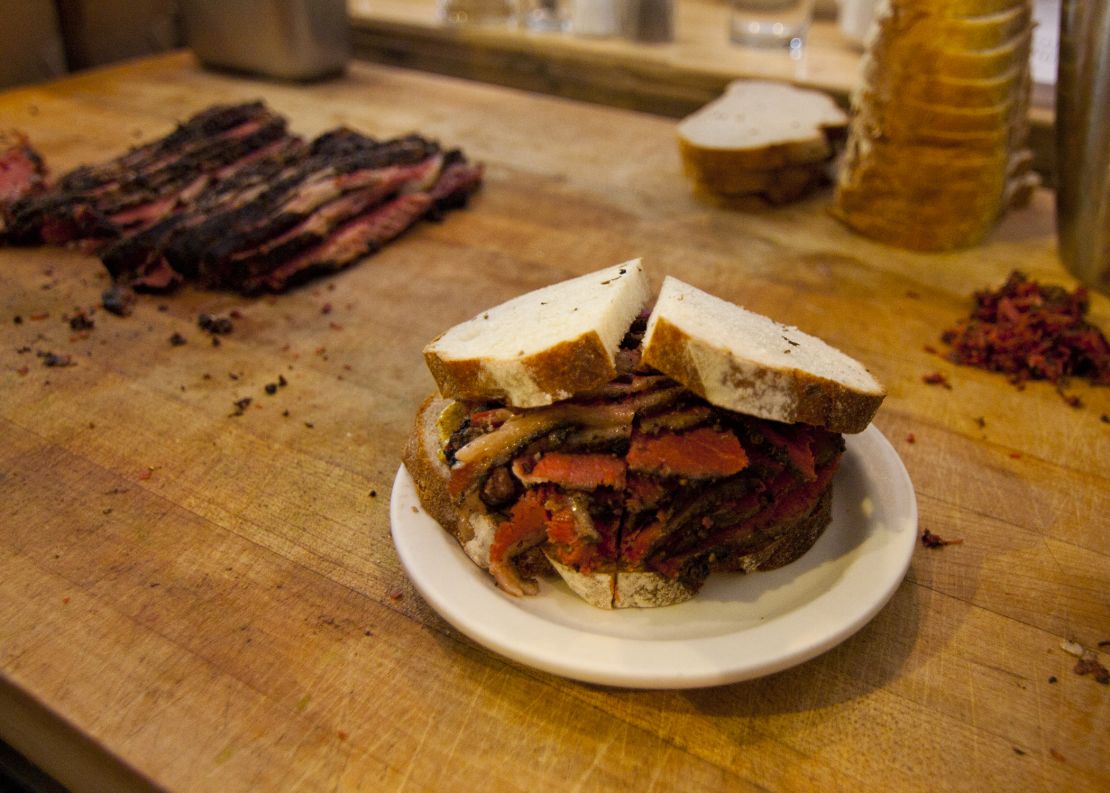
Origin: Montreal
Bread: rye
Filling: cured and smoked beef brisket
Toppings: mustard
What separates Montreal-style smoked meat and oft-compared pastrami is the cut of beef (brisket for smoked meat, navel for pastrami) and the spices that go into the original brine – reportedly more cracked peppercorns and coriander for the Montreal meat, as well as less sugar.
What results is meat that many people say tastes sweeter, more peppery and less spicy than smokier pastrami.
If proof is needed of its flavor, look to Mile End Meats, which brought the Montreal smoked meat to arguably the most pastrami-centric city in the world, New York, in 2010. Not only has Mile End Meats survived, but the deli and its take on Canadian fare is now a local favorite.
Mile End Delicatessen, 97A Hoyt St.; Brooklyn, NY; 718-852-7510; www.mileenddeli.com
2. Torta
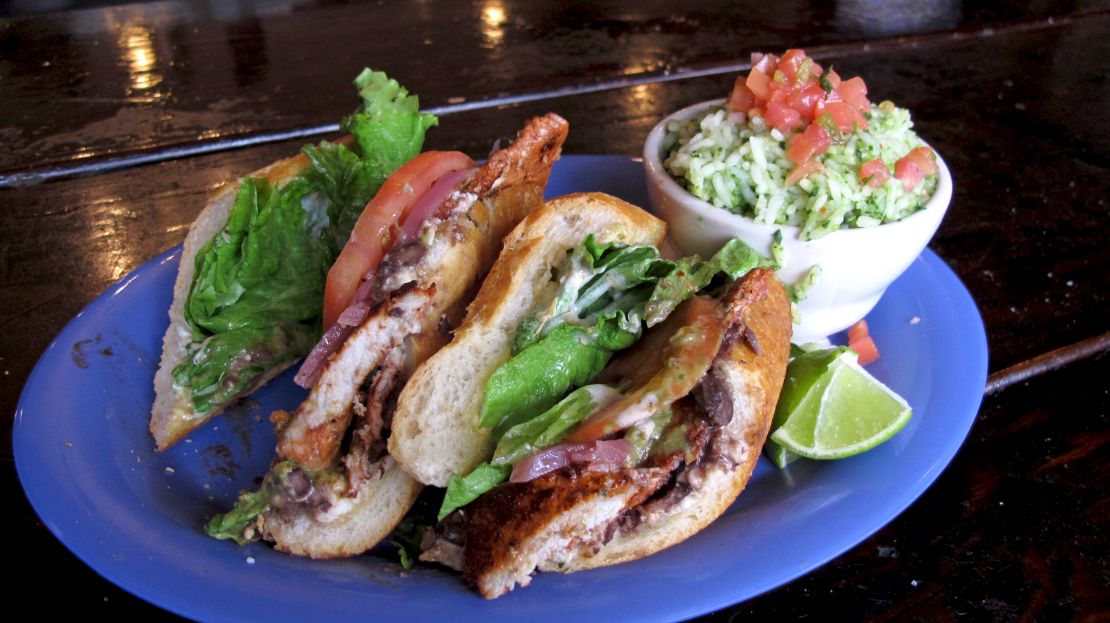
Origin: Mexico
Bread: bolillo
Filling: carne asada, shredded chicken, chorizo, ham, among others
Toppings: cheese, avocado, salsa, refried beans, eggs, among others
Those who believe that Mexican cuisine begins and ends with the tortilla obviously haven’t had the pleasure of eating a torta.
Typically served on a crusty football-shaped bolillo roll, the sandwich can be a platform for any number of Mexican favorite ingredients, from carne asada to pork belly, with traditional toppings such as lettuce, tomato and avocado.
In Phoenix, Los Reyes de la Torta offers 27 kinds of enormous torta, including the Especial, with ham, pork sirloin, breaded beef and melted cheese on a roll, completed by tomato, onions, jalapeño and avocado.
It’s also home to the King Carlos V, a monumental five-pound torta whose ingredients are too numerous to mention, even on the restaurant’s online menu.
Los Reyes de la Torta, 9230 N. Seventh St.; Phoenix; 602-870-2967
3. Bulgogi cheesesteak
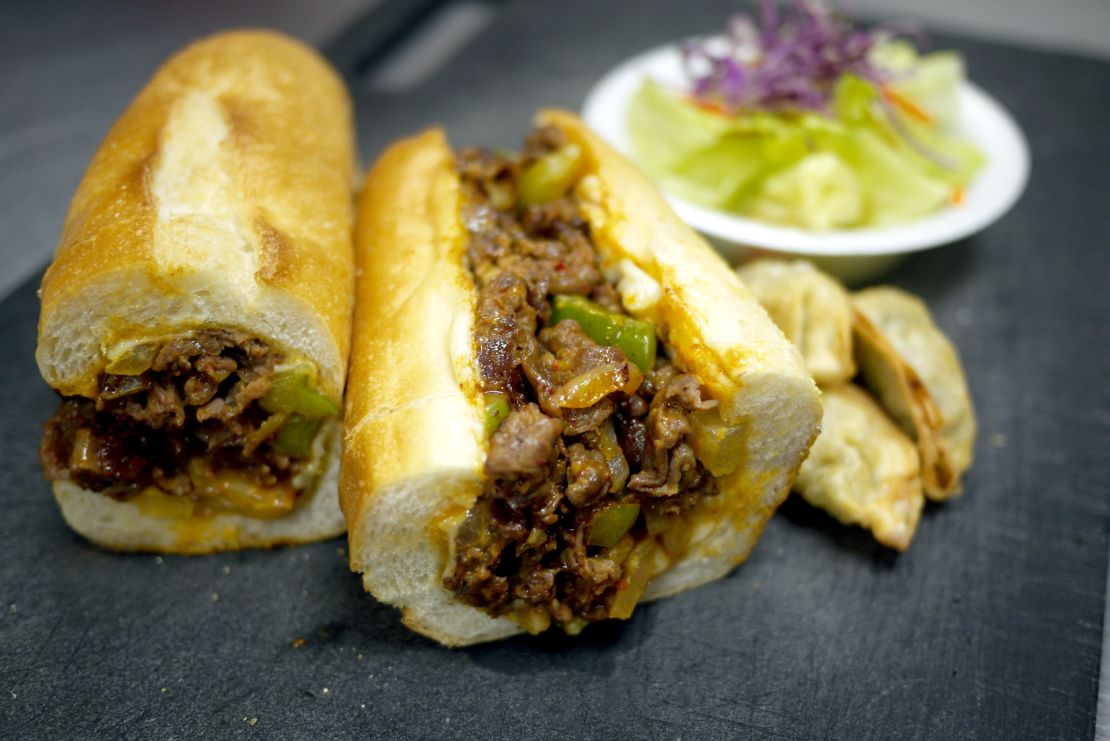
Origin: Philadelphia, by way of Korea
Bread: Italian bread
Filling: Korean-style marinated beef
Toppings: cheese, green peppers, onion, sweet chili oil
While Philadelphia is home to the Liberty Bell and First Continental Congress, it says something that its most famous export might be the cheesesteak.
Having started as a food truck, Koja Grille has introduced a distinctive Korean touch to the City of Brotherly Love’s signature sandwich.
While there are many similarities between the two sandwiches – both use Italian bread, melted cheese, onions and peppers – the bulgogi cheesesteak replaces the traditional chopped steak filling with bulgogi.
A Korean-style beef typically marinated in a mixture of spices and vegetables, bulgogi brings an entirely new complexity to the sandwich. Customers can also order a spicier version of the cheesesteak flavored with sweet chili oil.
Koja Grille, 10-A, 1600 N. Broad St., Philadelphia; 215-763-5652;
4. Smørrebrød
Origin: Denmark
Bread: rye
Filling: pickled herring, seafood, liver paté, cold cuts, among others
Toppings: butter, cucumber, tomato, hard-boiled egg, remoulade, cheese
Smørrebrød translates from Danish as “spread bread” or “butter bread.” For these open-faced sandwiches originally made for hard-toiling 19th-century Danish factory workers, the traditional base consists of sweet butter on dark rye bread, but what goes on top can vary greatly.
A typical combination might include smoked salmon fish cakes with dill and remoulade, a condiment like mild tartar sauce with a bit of a sour kick.
Aamanns-Copenhagen has earned some rave reviews by bringing the traditional Danish sandwich to New York with a modern twist. Its smørrebrød menu options include pork pâté with parsley, aquavit, hazelnuts, pickled apples, celery and watercress, and cured salmon with dill, pickled onions, endive and rye bread crumbs.
5. Pambazo
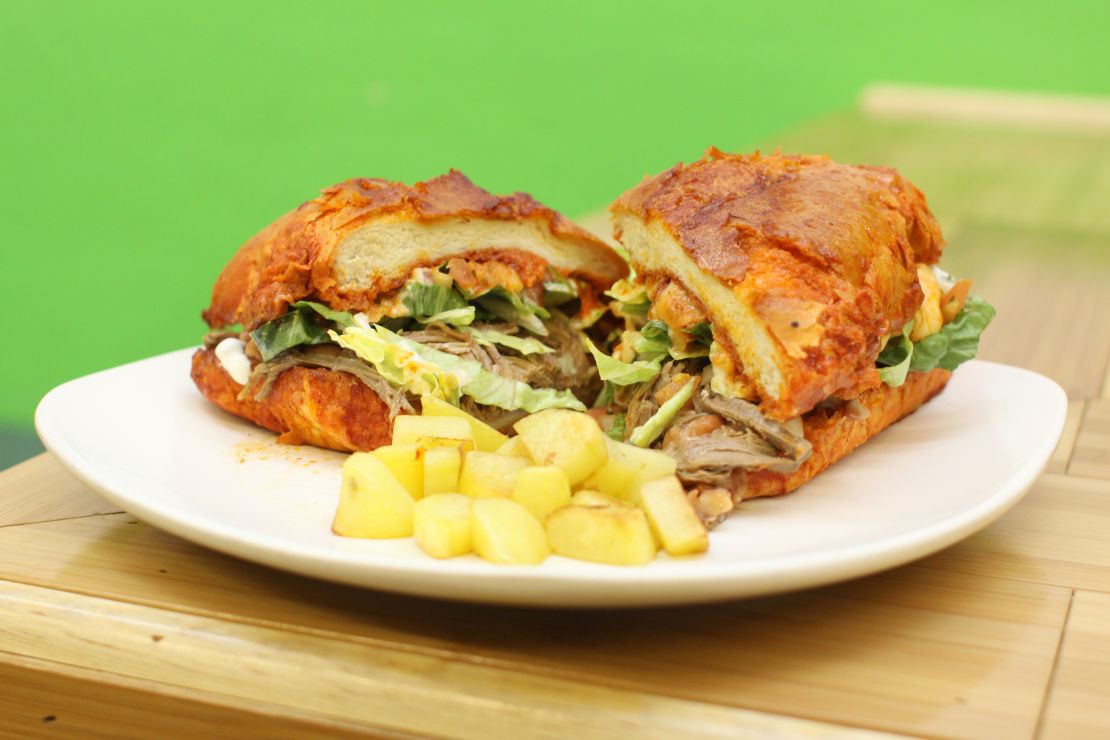
Origin: Mexico
Bread: bolillo or baguette
Filling: steak, chicken, chorizo, pork skin
Topping: pinto beans, potatoes, carrot, lettuce, crema
The Mexican pambazo jumps in the deep end when it comes to sauce. Rather than just serving the sandwich on the typical dry bread, the pambazo is first dipped in a red guajillo pepper sauce.
While it might raise the difficulty level in eating the sandwich (some recommend eating it with a knife and fork), it also adds flavor and a bit of heat.
Siete Luminarias in St. Louis has been serving pambazos since the restaurant opened in January 2012. Typically topped with lettuce, pico de gallo and sour cream, fillings might include chorizo, carne asada, chicken or carnitas, a Mexican-style long-braised pork.
Siete Luminarias, 2818 Cherokee St., St. Louis; 314-932-1333; sieteluminariasstl.weebly.com
6. Bánh Mì
Origin: Vietnam
Bread: baguette
Filling: ham, steamed pork, barbecue pork, barbecue chicken, fried eggs, tofu
Toppings: cucumber, cilantro, pickled carrots, pickled daikon radish, mayonnaise, jalapeño
The Vietnamese bánh mì is a perfect testament to balance.
Arriving in a crispy, fresh baguette, the inspired topping mix of pickled carrots and daikon, cucumber, cilantro, mayonnaise and jalapeño isn’t overwhelmed by the fillings, which can include everything from sweet barbecue pork to tofu to sardines.
Seattle’s Saigon Vietnam Deli serves 13 variations of the bánh mì, including steamed red pork, barbecue chicken and tofu.
Note: it may be a little difficult to identify the restaurant; it’s one of three “Saigon delis” within a two-block area.
Saigon Vietnam Deli, 1200 S. Jackson St., Seattle; 206-328-2357
7. Chacarero
Origin: Chile
Bread: marraqueta
Filling: thin-sliced beef, chicken
Toppings: tomato, mayonnaise, avocado, chiles, green beans
It has been said that just as New York has pastrami on rye and Chicago has the Italian beef, Santiago, Chile, has the chacarero.
If you like green bean casserole during the holidays, you’re going to love this sandwich.
Served on marraqueta, a crusty Chilean bread with a distinctive split down the middle, the chacarero features thin-sliced beef or chicken topped with tomatoes, mayonnaise, mashed avocado and a pile of green beans.
8. Tonkatsu
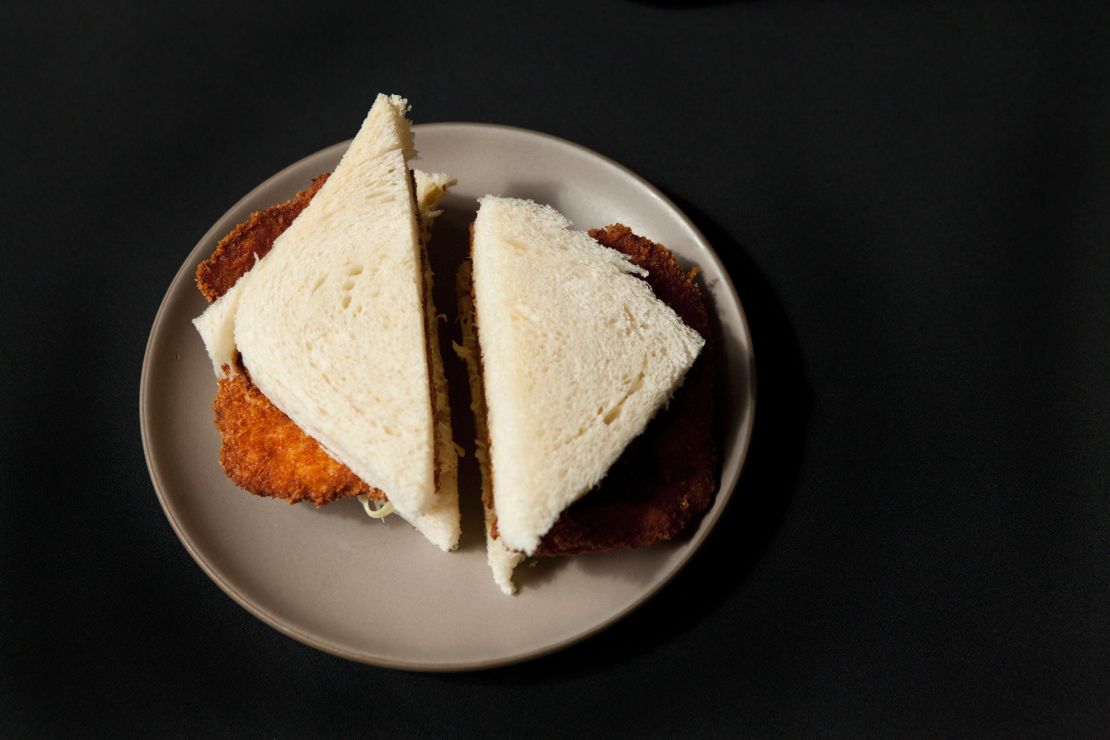
Origin: Japan
Bread: white
Filling: fried pork cutlet
Toppings: tonkatsu sauce, cabbage, Asian-style slaw, mayonnaise
Don’t be put off by the white bread, because the Japanese tonkatsu sandwich is anything but mundane. Of course, how could you go wrong with a pork cutlet that’s been coated with flaky panko breadcrumbs and deep fried?
Known as “katsu sando” in Japan, the sandwich is typically served with shredded cabbage and tonkatsu sauce, a fruity Worcestershire-type condiment.
San Francisco’s Nojo offers an updated version with fried pork served on crust-less slices of pain de mie, with Asian-style slaw and spicy ponzu (citrus sauce) mayonnaise.
Nojo, 231 Franklin St., San Francisco; 415-896-4587
9. Chivito
Origin: Uruguay
Bread: Portuguese roll or kaiser
Filling: steak, ham, bacon
Toppings: onion, mayonnaise, lettuce, tomato, mozzarella cheese, olives, hard-boiled egg, lettuce
Known informally as the national dish of Uruguay, the chivito is almost like a South American version of the precariously layered Dagwood sandwich.
However it’s described, it can’t be seen as an example of culinary restraint.
For example, Tabaré in Brooklyn offers a Chivito Completo on its menu with grass-fed filet mignon, mozzarella, black forest ham, fried organic egg, caramelized onions, roasted red peppers, Spanish olives, butter lettuce, vine tomato and aioli.
And, yes, it comes with fries on the side.
Tabaré, 221 S. First St.; Brooklyn, NY, 347-335-0187
10. Cemita
Origin: Mexico
Bread: cemita
Filling: breaded pork chop, carne asada, marinated pork
Toppings: avocado, adobo chipotle peppers, Oaxacan cheese, papalo, refried beans
Served on a large, crusty egg bun covered in sesame seeds, the cemita originally comes from the Mexican state of Puebla.
Standard toppings include a spread of avocado, chipotle peppers, Oaxacan cheese and, if in season, papalo, an herb with a taste somewhere between cilantro and arugula.
The cemita can be filled with everything from al pastor (marinated pork) to pata, also known as cow foot.
Variations at Cemitas Puebla, a family-owned restaurant in Chicago, include the Milanesa, with a thinly pounded, deep-fried pork loin cutlet that’s similar in style to a very thin chicken fried steak.
Cemitas Puebla, 3619 W. North Ave.; Chicago; 773-772-8435;www.cemitaspuebla.com
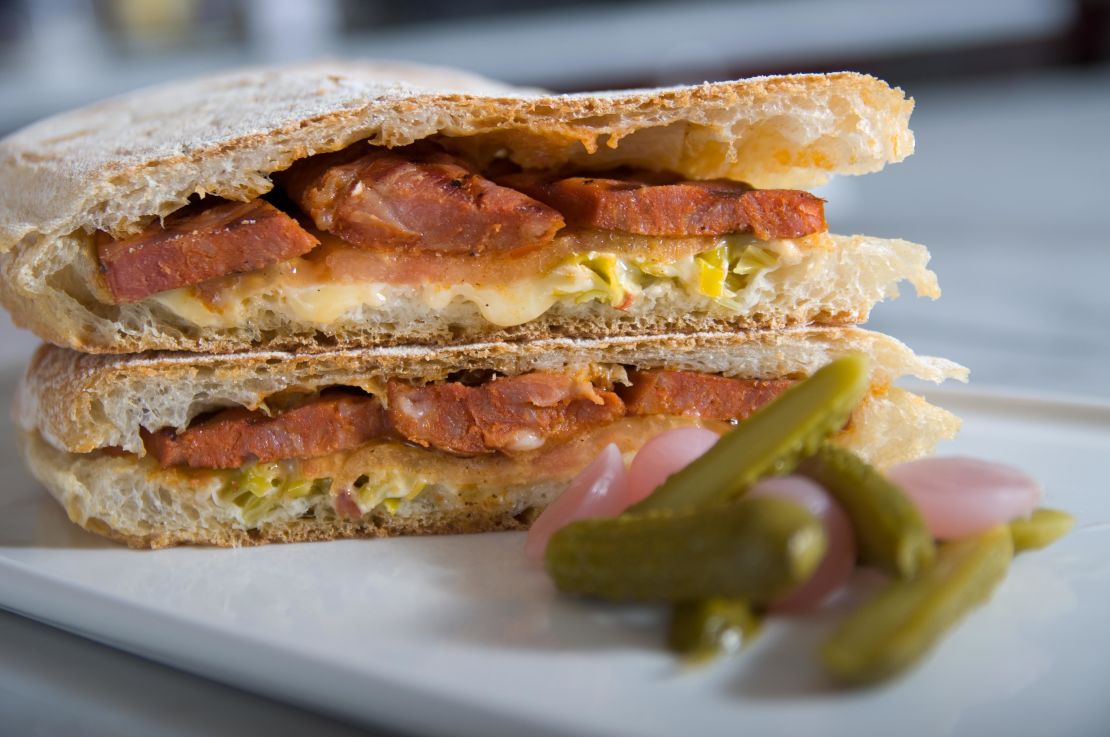
11. Bocadillo
Origin: Spain
Bread: Spanish
Filling: dry-cured ham, chorizo, tuna, and potato omelet, among others
Toppings: tomato, olive oil, manchego cheese
In Spain, the bocadillo is seen as a snack, not a full lunch, and is typically found in cafés and tapas bars. What makes this sandwich work is its simplicity.
A typical bocadillo might be made with a few ultra-thin slices of air-cured ham, such as jamón serrano or jamón ibérico, on Spanish bread that has been moistened with a sliced tomato.
New York’s Despaña Tapas Cafe has a bocadillo tradicional on its menu and 14 other varieties, including chorizo, olive oil and manchego cheese, as well as a vegetarian option with white asparagus, olives and piquillo peppers.
Despaña: 408 Broome St.; New York; 212-219-5050; www.despananyc.com
Story originally published March 2013; updated August 24, 2013.













